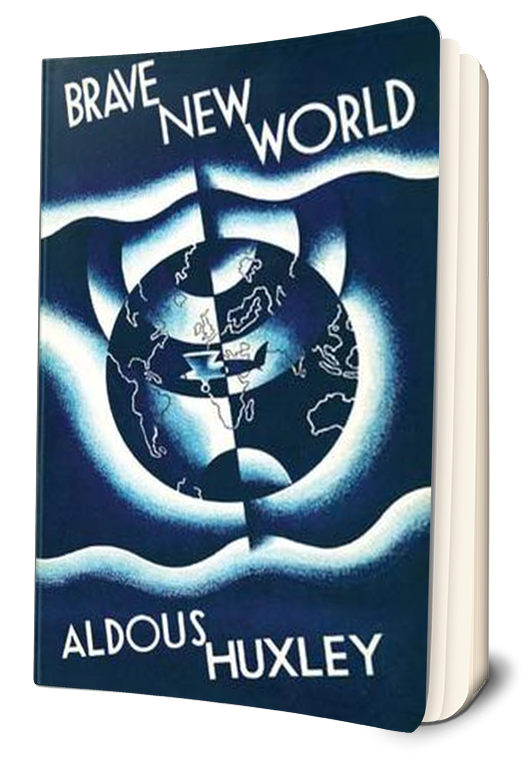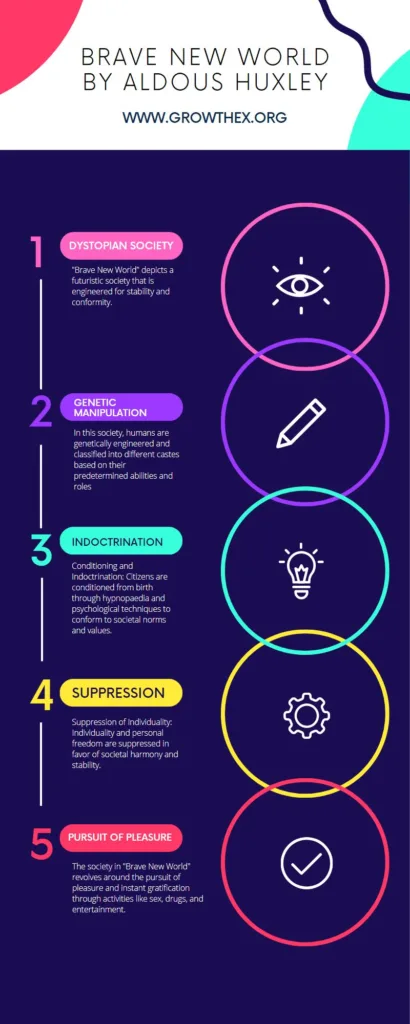In the utopian society depicted in Brave New World, which is flawlessly built around commerce and scientific efficiency, everyone appears to be pleased, cheerful, and conforming—but only at first.

During a tour of the “Hatchery and Conditioning Centre” in London in the year 2540 AD, World Controller Mustapha Mond tells a group of kids, “You can’t consume much if you sit still and read books.” He’s right, and reading books like Brave New World will make you want to consume even less in the future.
The 1932 publication of Brave New World, along with its brother 1984, the other of two seminal books describing what a contemporary dystopia may look like, was decades ahead of its time. Contrary to 1984, the people of Brave New World are slaves to pleasure rather than suffering.
Aldous Huxley, a writer who lived in the extraordinarily unstable political time between World Wars I and II, was both lured to the concept of stability (even to the point of forgoing democracy) and scared by what dominance of any type may bring. When he arrived in the US during the Roaring 20s, the drug culture, promiscuity, consumerism, and partying terrified him.
As a result, Brave fresh World is an ambivalent novel that is subject to numerous readings. Even now, after selling millions of copies throughout its nearly 100-year run in print, fresh interpretations of the book are still being offered. A brand-new TV series premiered only in 2020, and teenagers read the book as a requirement for their high school diploma every year.
It seems inevitable that a world where you can have it everything would be meaningless.
“In a world where everything is available, nothing has any meaning,” Margaret Atwood said in the foreword to the 2007 edition of the book. Such a world exists in the London the novel describes.
Humans, from intelligent Alphas to “semi-moron” Epsilons, are created in bottles as needed to complete specific duties. People are sleep-conditioned from birth to maintain their caste, give priority to simple pleasures like sex and “soma,” the ideal drug, and to eat as much as they can. As a result, everyone is amiable, obedient, and perpetually high from drugs or orgasms – and no one is ever by themselves.
The psychotherapist Bernard Marx and the author Helmholtz Watson, two of the book’s protagonists, are able to see through this façade of superficial fulfilment. In his promiscuous environment, Bernard wishes to be in a traditional, monogamous relationship, ideally with the stunning but very fit hatchery worker Lenina Crowne. Helmholtz believes that his writing has a higher purpose, but he is unable to use this “latent power” while producing the nonsense that his position demands:
There is nothing to strive for in life when everything is at your fingertips. No objectives. No place to go. And eventually, not having a goal in life will cause us to become restless. Not just physically, but also mentally, humans are meant to move. Our brains require mental exercise. Our spirits yearn to create beauty and creativity, not only to admire them.
It is this cage that Helmholtz and Bernard want to escape from, the former by taking the woman of his dreams on a risky journey and the latter by writing some audacious sentences and reading them to his students. The second lesson is that breaking the mold would always result in difficulty for both of them.
Nothing bothers us more than not being accepted, but even in the most homogeneous organizations, individuals will always differ.
Nothing bothers us more than not being accepted, but even in the most homogeneous organisations, individuals will always differ.
Helmholtz is a wonderful example of an Alpha, but he is too smart for his own good. Bernard, on the other hand, is slightly shorter than intended due to an error in his “hatching,” and as a result, he is frequently made fun of by ladies, peers, and even his subordinates. You have a man that others, including Lenina, wish “weren’t so odd,” when you add in his propensity for monogamy.
Despite his best efforts, Bernard is unable to discover any conformity to make up for it. His drug-induced “soma holidays” are never sustained, and even going to “Solidarity Service,” which is essentially a sex orgy supported by electronic music, doesn’t offer any long-term solace.
Fortunately, Lenina consents to travel with Bernard on what is intended to be a romantic journey to a New Mexico natural reservation. There, in addition to witnessing people going about their daily lives according to tradition—giving birth, using alcohol, engaging in religious rites, foraging for food, ageing, and lamenting their dead—they also come across John, known as “the Savage.”
It turns out that Linda, a woman he brought to the reserve years ago and who still resides there, loathing every second of it, is the mother of John, the hatchery director’s illegitimate son. John, like Bernard, has been shunned by his Native American tribe because of his unusual appearance (and later, his reading skills, which he utilises to gorge himself on Shakespeare’s works). Naturally, Bernard is ecstatic to find someone who doesn’t fit in like him.
He explains to John, “You see, I guess I’m somewhat different from most people. Yes, that’s exactly it, says John. “One is destined to be lonely if one is different.” The more you read the book, the more you’ll realize that, despite John and Bernard being the most obvious instances, every one of the key characters is in some way distinct from the group they’re supposed to belong to, and this is their worst cause of anguish.
Real poetry is what Helmholtz aspires to compose, but he isn’t allowed to. To her friend Fanny’s dismay, Lenina secretly yearns for some monogamy as well. When it is revealed that he fathered a child, the hatchery’s director is fired. Even the World Controller, Mustapha Mond, was at first a man of science who asked too many questions, which is how he initially became a Controller by choosing agony over exile.
Few hurts are as deep-seated as the sorrow of not belonging and feeling rejected by our fellow people, but despite our best efforts to resemble one another, humans will always be unique. Actually, if we can accept, value, and make use of our differences, they will be our greatest asset as a species.
The next time you experience loneliness or isolation, keep in mind that uniformity is a fallacy. We can’t and shouldn’t ever be homogeneous. It’s crucial to have close relationships with your friends, family, and coworkers, but our equality is based on the reality that we are all people, not on any particular set of characteristics.
True happiness requires that we acknowledge the possibility of pain.
Bernard comes up with a fantastic plan: he’ll take the Savage and Linda back to London, using them to shame the director into backing down from his threat to put him into exile in Iceland due to his peculiar behaviour. The strategy first succeeds and even makes Bernard famous because he is now in charge of the enigmatic Savage that everyone is eager to see.
The book’s title is taken from a Shakespearean line uttered by John just before he leaves the reservation: “O brave new world that has such people in it. At first, John is likewise thrilled, not the least because he likes Lenina. Start right away. But the excitement and awe soon fade, and when John’s disappointment forces him to isolate himself in his room, Bernard loses the favor of his visitors.
Nothing costs enough here, says John, yearning more to be the heroic hero of a Shakespeare play than a drowsy but dead person. I don’t desire ease. God, poetry, genuine risk, freedom, and goodness are things I want. He will subsequently say to Mustapha Mond in a crucial exchange that occurs later in the book, “I want sin. But first, he attacks Lenina, who appears to be only too eager to have sex with him because she senses that they are attracted to each other.
John hurries to the hospital, making a spectacle (as saying farewell to the dying is not something people generally do), when he learns that his mother Linda is dying from continuously taking soma since he arrived. He eventually teams up with Helmholtz to battle an army of Epsilons that are seeking to “liberate” them by stealing their soma meals. Bernard makes an attempt to break up the fight, but all three end up being brought before Mustapha Mond.
Both Bernard and Helmholtz have been sentenced to exile, which Helmholtz relishes but which Bernard detests. Even Mond refers to it as a reward since on islands, all the intellectual, independent individuals congregate, removed from conditioned civilization. In choosing the Falkland Islands for his exile, Helmholtz reasoned that the islands’ inclement weather would spur his writing. “You’ve got to be hurt and upset; otherwise you can’t think of the really good, penetrating, X-rayish phrases,” he said.
While the Savage is forced to remain, the World Controller eventually concedes that he has a point when he declares, “I’m claiming the right to be unhappy.” Mond acknowledges that the shallow but stable contentment he now observes around him was chosen by the government at the expense of art, science, and religion:
Happiness in Brave New World is unreal because it neither results from real living nor is it a penance for suffering. Since it only provides a minimal amount of fake contentment, neither we nor the primary characters find it to be wholly satisfactory.
In order to write better, Helmholtz wants to be depressed. John aspires to fight for Lenina’s affection. Even the World Controller wishes he could investigate science rather than destroy it at one point. “What fun it would be,” he muses, “if one didn’t have to think about happiness!”
John ultimately receives what he requests. He even occasionally spanks himself to atone for his transgressions while living blissfully by himself in a lighthouse. However, when the citizens of London learn about it, they attack him at his house, and the following wrath leads to an orgy. The following day, after becoming aware of what he has let himself to become, he hangs himself because he is unable to continue to cope with the reality that everyone around him is continuously coping.
No matter how hard we try, we cannot manufacture happiness. True happiness can never be something we can receive on demand or by taking a medication. It is frequently a side effect and occasionally a hard-won reward. The most significant lesson the book can impart to us is that if we reject the possibility of sorrow, we simultaneously reject the possibility of real, profound enjoyment.

If you found this “Brave New World Book Summary” helpful, be sure to explore more book summaries for further inspiration and knowledge. :